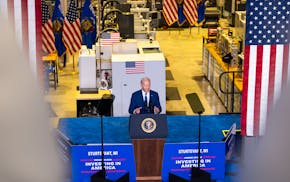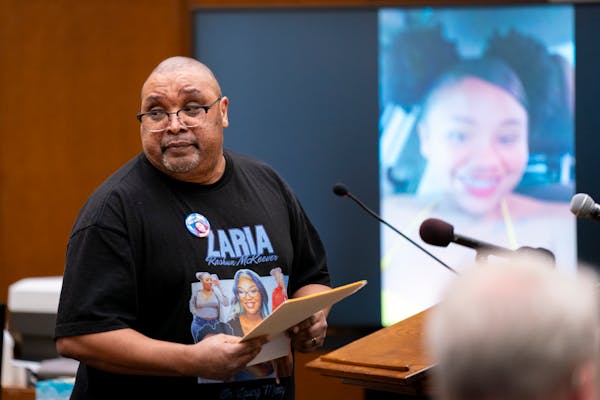Tony Andreason, a 40-year veteran of the financial planning trade, chatted recently with business students from the University of Minnesota who are completing summer internships at his company, North Star Resource Group.
Andreason, 66, talked about clients and how a couple of his Minnetonka neighbors lost millions chasing fictitious yields, thanks to Bernie Madoff.
"One of my mentors told me to never look at a ... client as a fee or commission," said Andreason, who has built a comfortable living serving doctors and university professors, as well as blue-collar friends from the old neighborhood. "Look at them as people who need a service. Invest time. Never pressure or entice them. They will call when they need you."
The students never guessed this guy had just come off a three-week European tour. Besides his day job, Andreason, at 66, is a born-again rock star.
Andreason, who in 1968 passed on a job with the Minneapolis Police Department to become an insurance agent, never thought of himself as a big deal. But the 1961 Henry High grad and his North Side garage-band mates, the Trashmen, scored several hits, including the jabber-mouthed, up-tempo "Surfin' Bird" by the time they were 23. The song continues to rev up TV shows, movies and commercials.
"We never had any aspirations for stardom or took ourselves too seriously," said Andreason. "We just loved music. We started playing together in 1957. And I was playing to pay my way through school."
The son of a gas station owner, Andreason changed his share of tires and swept up at night. He didn't realize it then, but he also was getting his first big lesson in markets and money.
The Trashmen recorded "Surfin' Bird" in 1963. It hit No. 4 on the Billboard Hot 100. Bingo.
They were catapulted from high school sock hops to Midwest ballrooms, such as the Marigold, the Prom and even national venues. "Surfin Bird" and a few less popular hits helped them get concert gigs that paid the foursome up to $250 each per engagement -- more than their fathers earned in a week. They also met unscrupulous promoters who paid them less than they'd been promised -- or stiffed them altogether.
"Back then, we would get 3 cents for every album sold and we didn't always get paid," Andreason said. "That was the music industry."
Trashmen peaked
The rock and roll scene by 1967 was swarmed by the Beatles, the Rolling Stones and a new genre of bands. For the Trashmen, the fun and notoriety was ebbing. Increasingly, they were relegated to warm-up acts and gigs in local clubs. They didn't like the drunks and druggies.
"We just stopped playing and decided to move on," Andreason said. "Bands come and go. And we did not want to play bars five nights a week."
Instead, they went on to careers as financial planners, IT managers and educators.
Andreason worked six days a week at North Star for the first several years, cold-calling and networking his way into a lucrative practice at a business that today boasts nearly 200 financial advisers, lawyers and CPAs.
He played music, but mostly bluegrass in a series of amateur bands before becoming a mainstay in what is today the Platte River Boys, a top regional draw.
The Trashmen were born again in 1988, at the urging of an old friend, to play a benefit concert to raise money for a cancer victim. It was fun. The original three members are Andreason, lead guitarist and vocalist; Dal Winslow, rhythm guitar and vocals; and Bob Reed, bass guitarist. Mark Andreason, Tony's brother, took over as drummer after Steve Wahrer died in 1989.
European fans
A couple of years ago, a musician friend told Andreason that early rock and roll, including the Trashmen, had a big European following. The Trashmen toured for a week in 2008. This month, they concluded a 21-day tour of Austria, Switzerland, Germany, Belgium, Italy and France, playing to crowds that ranged from a few hundred in clubs to thousands at an outdoor weekend festival.
"And we get paid in euros," quipped Andreason. "But by the time we cover our expenses, it's not big money."
Said longtime booking agent Tim Kehr, "Here's a bunch of 60-year-olds who get to act 18 years old again and who get paid to do what they love. They're on the 'nostaligia tour.' How do you beat that?"
Back in the office last week, Andreason told the aspiring financial advisers that he always loved his job.
Only one in three first-year people survive at North Star, despite a three-year guaranteed salary that peaks at $27,000 in the first year, as they learn the ropes and acquire clients. Only 15 percent of planners survive the first three years, according to industry statistics.
"I like that it's a people business," said intern Michael Paulus, a finance major at the university. "I'm just not going to be cracking price-to-earnings ratios."
Andreason nodded and said the early years can be tough, demanding persistence and long hours.
"This isn't work," said the old maestro. "This is fun. The people in north Minneapolis, where I grew up, worked. They went to gas stations and factories and got dirty. Here, we stress long-term thinking and appropriate products from good companies. You're helping people. This is fun."
Kind of like playing music.
Neal St. Anthony • 612-673-7144 • nstanthony@startribune.com

